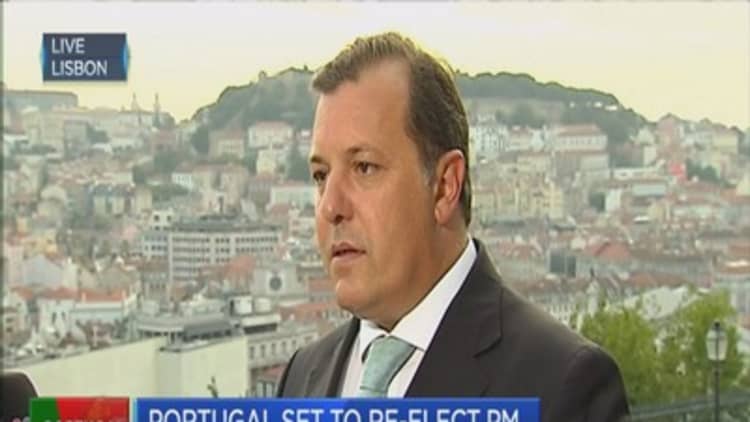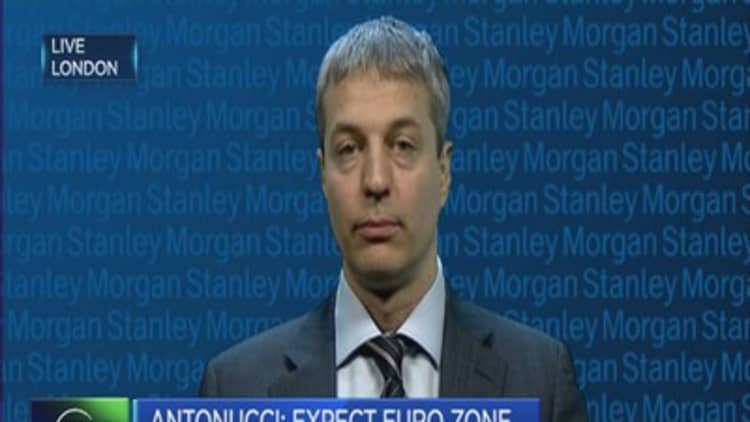



Portugal is set to back widespread spending cuts and tax rises as the country center-right ruling coalition is on course to win a general election on Sunday.
The "Portugal Ahead" alliance (PaF) of the PSD and CDS-PP parties, led by incumbent Prime Minister Pedro Passos Coelho, has a much as a 12-point lead according to one opinion poll ahead of the election.
By 4pm local time, 44,38 percent of the 9,6m voters had cast ballots, implying a 2.4 percent increase from a similar vote the country held in 2011.
While a poll by Grupo Marktest of 1,607 people published Thursday gave "Portugal Ahead" about 41 percent of the votes to the opposition Socialist party's 29 percent, most polls give the alliance a more modest lead.
The largest poll published on Thursday by Catolica University gave the conservative coalition 38 percent of the vote with the Socialist party (PS) garnering 32 percent. However, 15 percent of the 3,302 people surveyed were undecided, however, Reuters reported.
If voter apathy or indecision remains and the poll is borne out in the election result, the coalition would still fall short of gaining a majority of seats in the Portuguese parliament. Yet the Socialist party has vowed not to work with the conservative coalition, with the party's leader saying recently he would only consider a grand coalition "if there was ana alien invasion" of Portugal.
One stand-out aspect of any re-election of incumbent Prime Minister Passos Coelho would be the fact that he would be the first prime minister in the euro zone to implement the unpopular austerity measures required by the country's 78 billion euro ($87.1 billion) financial bailout in 2011 and yet be re-elected.
Having implemented some of the largest spending cuts in the last 50 years along with swingeing tax rises, Portugal's government appears to have got the country back on its feet. The country exited its bailout program successfully in 2014 and is seeing some of the best growth rates now in the 19-member euro zone, expected to grow 1.6 percent in 2015, according to the European Commission.
Leonardo Mathias, Portuguese assistant secretary of state for the economy, told CNBC that he was proud of the conservative party's record in implementing the country's financial bailout and austerity and reforms required by lenders.
"We feel very excited about the job we've done. Over four years we had a very deep and quick austerity program, we changed the structure of out economy and now have a completely different macro-economic landscape. We enacted over 450 reforms including business reforms, labor reform and competition reforms," he said.
"We got the country growing again and we have export growth, investment growth and foreign direct investment," he said, adding that it was a case of "mission accomplished."
Read More Austerity a vote-winner? This poll could be a shocker
A surprise result cannot be ruled out, according to Deutsche Bank, although most analysts are agreed that the center-right is likely to retain power.
"In September the formal coalition has been achieving 35-40 percent of the popular vote in most polls, giving it a lead of around 5 percent on PS," economist Peter Sidorov, and strategist Jack Di Lizia said in a note Thursday.
"(But) this is still short of the slightly over 40 percent likely required to achieve an outright majority in parliament but given the uncertainty of the polls and the large share of undecided voters, neither a centre-right absolute majority nor a better performance by the PS can be ruled out."
Meanwhile, Antonio Barroso, vice president at risk consultancy Teneo Intelligence said that, barring any last-minute upset that leads to an absolute majority for the coalition, "the most probable scenario is a plurality for the center-right."
"Although government formation might be tricky, incumbent PM Pedro Passos Coelho has a good shot at being re-appointed," as a result, he added in a note Wednesday.
Paul Schefelhout, president of Portuguese investment firm Finangeste, said the two main conservative and socialist candidates had policies in common -- mainly that of maintaining Portugal's economic momentum.
"Both candidates are very moderate, both are pro-investment and both are standing for the growth of Portugal so the electorate has a hard time choosing between two platforms that are very similar," he told CNBC in Lisbon, Portugal.
"Both want to keep Portugal in the limelight of international investors and want to give markets (the belief) that nothing's going to change and that the cycle of growth is going to continue," he said.
- By CNBC's Holly Ellyatt, follow her on Twitter @HollyEllyatt. Follow us on Twitter: @CNBCWorld


